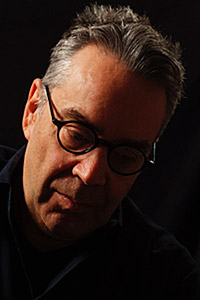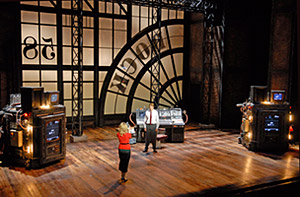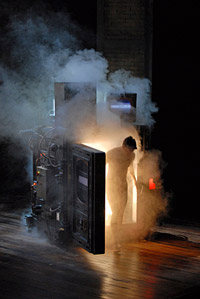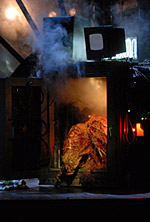

  |
|
|
||||||||||||||||||||||
|
FMS FEATURE... September 2, 2008 The Fly Takes Wing at L.A. Opera Howard Shore's new stage work preps for US premiere by Jon Burlingame  Composer Howard Shore Shore spoke from Paris, where LA Opera's partner, Theatre du Chatelet, debuted the two-hour work on July 2. He is now in Los Angeles, working alongside conductor Placido Domingo and director David Cronenberg to rehearse The Fly for its six performances (running through Sept. 27; visit http://www.laopera.com and http://www.theflytheopera.com). "It's very respectful of the great tradition of opera, and in some ways it reaches from the 19th century to the 21st," the composer explains. "It does have arias, duets and trios, traditional forms. I wasn't trying to reinvent the world of opera. I just wanted to create something from my own heart and my own compositional creativity within that form that I love so much." The Fly is based on the 1957 George Langelaan short story (which was faithfully adapted into the classic 1958 film) and Cronenberg's 1986 film remake that starred Jeff Goldblum and Geena Davis and won an Oscar for its elaborate makeup effects. The opera is structured much like the Cronenberg film, although the libretto – by theater veteran David Henry Hwang – is a completely new work.  Ruxandra Donose (Veronica Quaife) and Daniel Okulitch (Seth Brundle) in Shore says he thought of turning the science-fiction tale into an opera years ago, and when offered the opportunity, enlisted both Cronenberg and their mutual friend Hwang (who adapted his own M. Butterfly for Cronenberg's 1993 film) to collaborate. In turn, they brought in famed production designer Dante Ferretti (Sweeney Todd, The Aviator) and costume designer Denise Cronenberg (who has done several of her brother's films and such others as The Incredible Hulk). The timing was right for Shore, too. Having spent four years writing ten and a half hours of music for The Lord of the Rings trilogy, much of which involved vocalists and choirs – and which won three Oscars and four Grammys – "I wanted to extend my writing for the voice," he says. "Here was a way for me to work with really incredible artists and orchestra on a purely musical journey, setting the pace for a night of theater."  Daniel Okulitch (Seth Brundle) in A key difference between the 1986 film and the opera is the time period. The new work is set in the 1950s, and that is reflected not only in the costumes and colorful, lights-blinking and primitive-video-screens laboratory but in the music itself. "I like to write to the period as much as I did in things like The Lord of the Rings – which was to illustrate a world of 5,000 years ago – or Naked Lunch or Ed Wood. So I'm influenced by the music and the culture of the '50s. It was after the war, when individual expression became very distinct. The music is of my own design, something I'm interested in, which has to do with contrapuntal relationships. It extends my compositional ideas further. It was one of the reasons I wanted to work in an extended form like this." Shore also liked "the themes of transformation, dual personality, science gone wrong – such an interesting theme because it deals with genetics... the idea of the transformation of the man from one type of life to another, and the smaller story, how his love tries to save him from this horrible disease. It has grand themes and these smaller, more intimate moments." 
The LA Opera orchestra will consist of about 68 players, with a chorus of 44. Domingo will conduct four of the six performances; Israel Gursky will conduct the remaining two. Although it is sung in English, supertitles will be projected atop the stage and at the sides of the auditorium so that all of the lyrics will be clear to audiences. Mixed reviews for the Paris performances didn't dim Shore's enthusiasm for the opera's Los Angeles opening. "The audience is what we're interested in," he says. "The audience is so warm and so involved in the piece. You see the concentration, the involvement in the story. It's wonderful. That's really the joy of it, in the creation each night of a new work." Of equal interest to the composer was the notion of drawing on artists from many disciplines, many new to the opera world. "It's a very interesting combination. I think that's healthy. It's been a completely fun thing to do." ©2008 Jon Burlingame |
Search
Past Features
Feature Archives
|